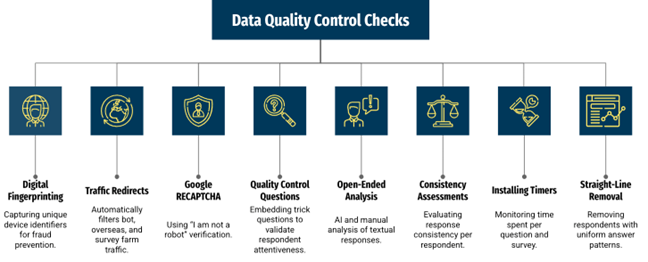Alright, pop quiz: What's making a comeback? (Besides the All-American Rejects, obviously.) The answer? Questionable survey data. Just like that catchy chorus, there's a "dirty little secret" lurking in the world of research, and it's time to expose it: sample quality. Because let's be honest, if your data isn't up to snuff, your insights are about as reliable as a politician's promise.
A Trip Down Memory Lane (and the Wild West) - The Evolution of “Who” We’re Talking To
Picture this: it's the early days of polling. Think of the 1936 Presidential election where the Literary Digest famously predicted Alf Landon would trounce FDR. They mailed out millions of surveys, but the sample? Heavily skewed toward those who subscribed to the magazine and owned telephones (a luxury back then). The result? A colossal, headline-making blunder.
That early era was a bit of the Wild West, with sampling often relying on whatever data was readily available. The focus was often on volume and speed, not the nuances of who was being surveyed. Panels were frequently smaller, often built on lists purchased from various sources – think phone books, magazine subscriptions, and even public records. Verification methods were rudimentary, relying on basic demographics and, at best, rudimentary screening questions. Think of the old days of focus groups, where the recruiter might have gotten a referral from a friend of a friend, hoping they met the criteria.
This approach, while serving its purpose at the time, had inherent limitations. The lack of diversity, the potential for bias, and the vulnerability to fraud created significant risks. This was especially true in industries like political polling, where even a small sampling error could drastically alter the outcome of an election.
This lack of rigor was not limited to the political arena. Consumer research, marketing studies, and brand tracking efforts all suffered from similar challenges. Agencies struggled to build representative samples, often relying on the convenience of available data, which led to skewed results and inaccurate insights.
Fast forward to today, and the landscape has undergone a seismic shift. The internet, the explosion of social media, and the sheer volume of data available have fundamentally changed the game. We've seen the rise of online panels, programmatic sampling, and increasingly sophisticated methods for targeting specific demographics and behaviors. But with these advancements have come new and more insidious challenges. The prevalence of bots, fraudulent respondents, survey farms, and the rise of sophisticated AI-driven manipulation has exploded, making it harder than ever to ensure the integrity of your data.
Garbage In, Garbage Out: The Ripple Effect - The High Cost of Bad Data
Let's be crystal clear: the quality of your sample is the lifeblood of your research, the cornerstone upon which you build your insights. It's not just about getting a certain number of responses; it’s about getting the right responses from the right people, and that's becoming increasingly challenging.
- Quantitative Research: The Numbers Game Gone Wrong: In quantitative research, where statistical rigor is key, poor sample quality is a recipe for disaster. Imagine conducting a product concept test, only to find that your data is riddled with speeders, bots, or respondents who don't fit your target audience. The results will be a distorted view of consumer preferences, leading to flawed forecasts, ineffective marketing strategies, and potentially, millions of dollars wasted. Think of the pharmaceutical company that rushes a new drug to market based on faulty clinical trial results, or the retailer that opens a new store in the wrong location due to inaccurate market analysis. The consequences can be severe.
- Qualitative Research: The Human Element Undermined: Qualitative research thrives on depth, nuance, and the richness of human experience. Focus groups, in-depth interviews, and ethnographic studies are designed to uncover the "why" behind consumer behavior. But if your participants are not genuine, or do not meet the set criteria, your entire qualitative study is compromised.
- Imagine conducting a series of interviews about a new financial product only to discover that several participants are actually paid actors or are not the target demographic.
- Or imagine a series of focus groups on a new food product where the participants are not the target demographic or are not being honest about their opinions.
The insights you glean will be shallow, misleading, and ultimately useless. This can lead to missed opportunities, poor product development decisions, and an erosion of trust with your clients.
The Accelerant Research Difference: Owning the Solution
At Accelerant Research, we recognized the growing crisis in sample quality. That's why, 17 years ago, we made a bold decision: to build and maintain our own proprietary panel, Agora USA. Today, Agora USA stands as one of the largest self-owned panels in existence. This wasn’t just a business decision; it was a commitment to quality.
Why does owning our panel matter? Because it gives us unparalleled control. We can:
- Handpick Our Participants: We don’t rely on third-party aggregators or questionable sources. We recruit and manage our panel members directly, ensuring they meet our stringent quality criteria.
- Implement Rigorous Screening: We employ a multi-layered approach to prevent fraudulent responses, including advanced fraud detection and bot mitigation.
- Gather Richer Data: We have a deeper understanding of our panel members, allowing us to target the right people for your research projects.
- Ensure Transparency: We can provide full transparency into our sampling process, giving you confidence in the integrity of your data.
In a world increasingly dominated by bots and AI-generated responses, having a panel like Agora USA—comprised of real people, with verified identities—is more critical than ever. It’s the foundation upon which we build our reputation for providing high-quality, reliable data.

- Digital Fingerprinting: We use unique device identifiers to detect and prevent fraudulent respondents and multiple survey entries.
- Traffic Redirects: We actively filter out bot traffic, overseas respondents, and traffic from survey farms.
- Google RECAPTCHA: We utilize "I am not a robot" verification to ensure genuine human responses.
- Quality Control Questions: We embed trick questions to validate respondent attentiveness and weed out those who aren't paying attention.
- Open-Ended Analysis: We use AI and manual analysis to identify and flag suspicious or low-quality open-ended responses.
- Consistency Assessments: We evaluate response consistency across the survey to identify illogical or contradictory answers.
- Installing Timers: We monitor the time spent on each question and the overall survey to identify speeders and those who are not engaged.
- Straight-Line Removal: We remove respondents who consistently select the same answer choices, indicating a lack of engagement.
Beyond the Basics: The Accelerant Research Advantage in Fraud Prevention
At Accelerant Research, we're not content with just the basics. We know that the battle against fraud is an ongoing one, requiring constant vigilance and innovation. Here's a deeper dive into some of the advanced measures we take to protect the integrity of your data:
- Advanced Bot Detection: We leverage sophisticated algorithms that go beyond simple IP address checks. We analyze patterns of behavior, including mouse movements, typing speed, and the order in which questions are answered, to identify and eliminate bots. These algorithms are constantly updated to stay ahead of evolving bot technology.
- Geolocation Verification: While we use IP address geolocation, we also implement more nuanced methods. We cross-reference IP data with other location signals, such as time zone and mobile carrier information, to ensure that respondents are truly located where they claim to be.
- Multi-Factor Authentication: For certain high-value projects or sensitive topics, we may implement multi-factor authentication for panel members. This could involve verifying their identity through SMS, email, or other methods to provide an extra layer of security.
- Continuous Monitoring and Analysis: Our dedicated team of data quality experts continuously monitors our panel and survey data for signs of fraud. We use a combination of automated tools and manual review to identify and address any potential issues.
- Customized Fraud Prevention: We understand that every research project is unique. We work closely with our clients to tailor our fraud prevention measures to the specific needs of their study, taking into account the target audience, the research objectives, and the sensitivity of the topic.
- VPN Screening on Survey Entry: We screen for VPN usage at the beginning of the survey to prevent fraudulent respondents from masking their location and circumventing quality controls.
- Verification Prior to/Upon Payment: We verify respondent identities and behavior before issuing any payments, ensuring that we only compensate legitimate participants.
Enhancing Qualitative Recruiting with Short-Form Video: Seeing is Believing
For our qualitative research projects, we take quality control a step further by integrating short-form video into our recruiting process. This isn't just about verifying a person's identity; it's about gaining a real-world glimpse into their communication style and engagement, ensuring richer, more insightful sessions for our clients.
- Video Verification: As part of the screening process, potential participants are asked to record a short video answering specific questions. This allows us to visually confirm their identity, ensuring they match the demographic profile.
- Assessing Articulation and Engagement: The videos also serve as a valuable tool for assessing a participant's ability to articulate their thoughts and engage with the topic. We can evaluate their communication style, their enthusiasm, and their overall suitability for the qualitative study.
- Simulating Research Tasks: We may incorporate short research tasks into the video prompts. For example, we might ask participants to describe a product they recently purchased, or to react to a specific advertisement. This allows us to gauge their ability to respond to the types of questions they'll encounter during the actual research session.
- Quality Assurance: This approach helps us validate the targeted audience and select articulate participants who can provide deeper, richer insights to our clients. It moves beyond the "luck of the draw" and ensures that we're gathering data from engaged, qualified individuals.
The Bottom Line: Ask the Right Questions to Ensure Quality
Sample quality is not a "nice-to-have"; it's a must-have. It’s time to demand more from your research partners and to make sure you're getting the high-quality data you deserve. At Accelerant Research, we are committed to delivering genuine insights, backed by robust quality control. We're not afraid to tackle the "dirty little secret" of market research head-on because we believe in building trust and helping you make confident decisions.
Empower Yourself: Top 10 Questions to Ask About Sample Quality
Next time you're scoping for a research project, bring these questions to the table. Starting the conversation is the first step towards holding your providers accountable and ensuring you receive the high-quality sample your research deserves:
- Where does your sample come from (e.g., proprietary panel, third-party aggregators)?
- What are your panel recruitment methods?
- What measures do you take to prevent bot traffic and fraudulent responses?
- Do you use digital fingerprinting or other device-level checks?
- Do you employ CAPTCHA verification?
- How do you identify and remove straight-liners or speeders?
- Do you use open-ended questions or attention checks?
- What is the process for reviewing and validating open-ended responses?
- Do you have measures in place to detect and prevent VPN usage?
- Can you provide information about the panel's demographics and engagement metrics?
Let’s get in touch! If you have questions about sample quality or want to learn more about our quality control measures, feel free to reach out. Let's work together to ensure your research is built on a foundation of integrity.







.png)



